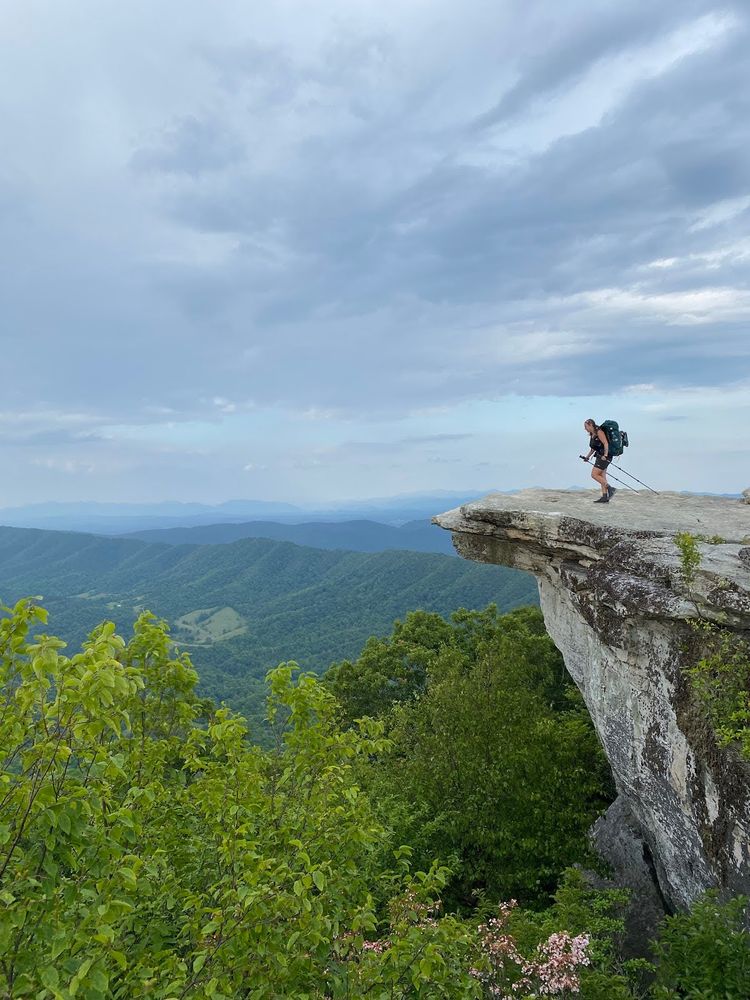Walking 2000 miles to learn a lesson

I’ll always remember June 24 as my longest day on trail. My body ached, and each step was chafing agony. I realized in my sullen state that I’d neglected to refill my water. I’d passed many creeks — even fallen into one earlier that day — but had told myself over and over that I’d get water later. It didn’t matter how thirsty I was: I’d do it later.
Eventually later came, and I was too dehydrated to ignore my thirst any longer. My map told me there wasn’t going to be water for another eight miles … and I’d already walked 15. Typically on this trail, water isn’t hard to come by, and hydration stops aren’t something you necessarily have to plan ahead for. While a 23-mile day isn’t impossible during a thru-hike, given the rugged incline ahead of me, I realized water likely wasn’t going to happen that day.
I was two months into a northbound Appalachian thru-hike attempt, hiking through southern Virginia. The Appalachian Trail is the longest continuous footpath in the world: 2,198.4 miles sprawling from Georgia all the way to Maine.
No help was coming. I resigned myself to finding a camping spot and being dehydrated all night. The sun was going to set in about an hour. I found a camping spot about two miles up another mountain, Spy Rock, with what was rumored to be one of the best sunset viewpoints on the trail. I felt strangely invigorated; hauling myself up this mountain for a beautiful sunset was the least I could do for myself after the terrible ways I’d neglected my body.
I walked faster than I ever had before, chasing the setting sun. I breathed heavily with each step, feeling like my lungs might burst from the frantic pace I kept. The skin on my collarbones had been rubbed clean off by my backpack straps, leaving exposed and bloodied patches in its place.
The last leg of the trek required light bouldering, something I wasn’t anticipating but did without question. I dropped my pack at the base and began climbing, shocked and impressed that I could even function in the state I was in. I hoisted myself up by my arms, throwing the rest of my body up over the top of the boulder. And there it was: Layers of lush green mountain sprawled before me, juxtaposing ethereal blends of orange and purple that kissed the mountain tops. Bright yellow light fought its way through dappled clouds, spraying gentle beams that highlighted each tree line.
The kaleidoscope of color was reflected in about 20 pools of rain water dappling the eroded rocktop I’d climbed to. That’s right: water! Sure, it was literal rain puddles, but at that moment it didn’t matter. I decided the rain water was likely from that morning, so I pulled out my filter and drank like my life depended on it (because it did).
I felt like a part of it all. In that moment, I wasn’t lonely or even tired, just grateful. In the same way the sunset touched the mountains, jewelweed patches obscured my views and rain left basins of water right where they were most needed, I belonged there, profoundly.
I’m off trail now and find myself immersed in regular day to day life again. I wish I could say that hiking the Appalachian Trail fixed my problems, left me grateful and totally at one with the world around me, but that’d be unrealistic.
But I will say, I think often of my time on trail and what it taught me.
Hiking the Appalachian Trail was a unique opportunity to cultivate my own personal relationship with the planet we live on. I carry that relationship and the lessons gleaned from it into everything I do. And I believe each of us cultivating a personal relationship with the planet we live on is paramount.
Outdoor recreation is a privilege, and extended hikes as long as the Appalachian Trail are rare occurrences, but I see the value in time outside. Whether it be sitting in a park in the city or hiking up a mountain, when we get outside, we’re reminded of the interconnectedness of it all and carry that knowledge with us when making our everyday choices.
When we feel brave or emboldened recreating outside, we carry that gumption into other aspects of our lives. When we feel appreciative of our natural resources, we’ll work harder to ensure those around us have access to the same resources.
Most importantly, when we’re reminded that we as people aren’t separate from nature, we understand that sustainability isn’t just about conserving, recycling or cleaning green spaces. If you care about the planet and are reminded of how interconnected we all are, you understand that caring about the environment extends to caring about the issues that affect people in your community.
Whether you’re hiking 2,000-plus miles and forgetting to drink water or just sitting in the sun on a Tuesday, I implore you to take a moment to consider your place on this planet.
Read more of the Mar. 20-26, 2024 issue.

















































